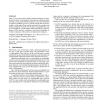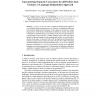122 search results - page 5 / 25 » Polymorphic variants in Haskell |
SAS
1994
Springer
13 years 11 months ago
1994
Springer
Strictness analysis has been a living field of investigation since Mycroft's original work in 1980, and is getting increasingly significant with the still wider use of lazy fu...
ICFP
2005
ACM
14 years 7 months ago
2005
ACM
MLF is a type system that extends a functional language with impredicative rank-n polymorphism. Type inference remains possible and only in some clearly defined situations, a loca...
BMCBI
2010
13 years 7 months ago
2010
Background: Polymorphic variants and mutations disrupting canonical splicing isoforms are among the leading causes of human hereditary disorders. While there is a substantial evid...
IFL
2007
Springer
14 years 1 months ago
2007
Springer
Haskell is a functional language, with features such as higher order functions and lazy evaluation, which allow succinct programs. These high-level features present many challenges...
TOOLS
2009
IEEE
14 years 2 months ago
2009
IEEE
A software product line (SPL) is a family of related program variants in a well-defined domain, generated from a set of features. A fundamental difference from classical applicati...



